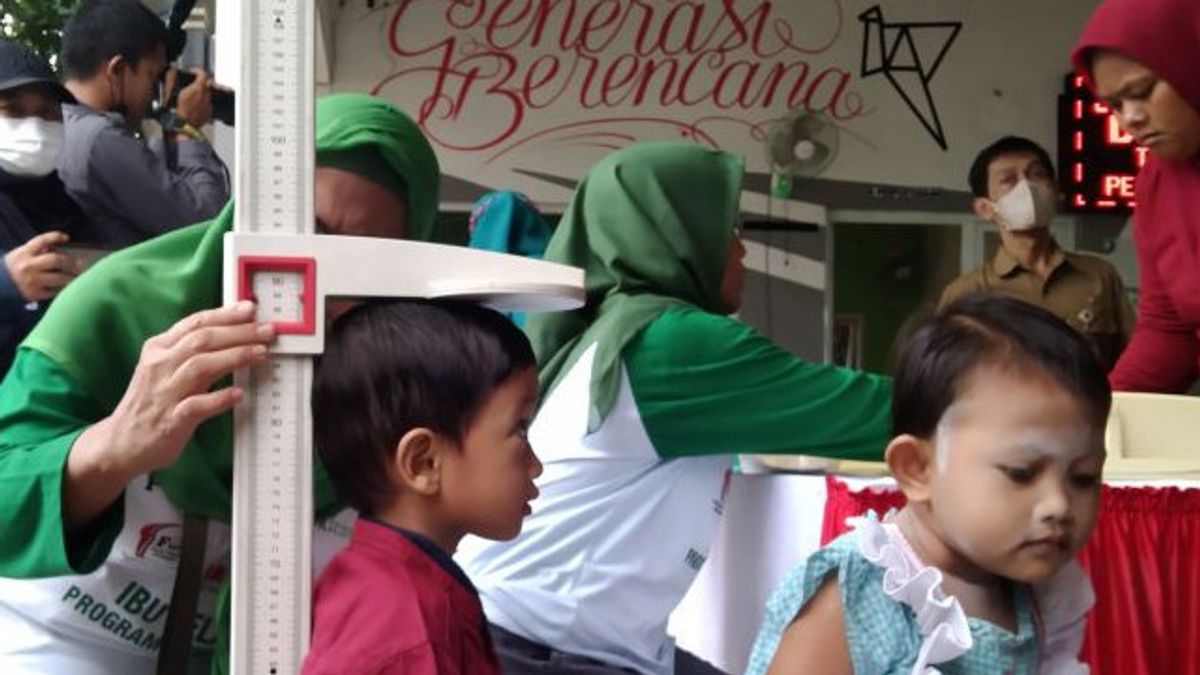JAKARTA - Acting Governor of DKI Heru Budi Hartono promised to directly supervise the handling of tengkes (stunting) cases in Jakarta as an effort to reduce the number of toddlers with tengkes.
"The kelurahan, puskesmas every Tuesday examine, weigh weight, provide nutrition, if necessary intervention from the Health Service. We sent a team of doctors," Heru said while reviewing child health services in West Semper, Cilincing, North Jakarta, Tuesday, January 31, as reported by Antara.
Heru plans to travel around a number of administrative points in DKI Jakarta to ensure the handling of tengkes.
He received all data on tengkes cases as long as it was based on the names and addresses that were synchronized both from the National Population and Family Planning Agency (BKKBN), the Central Statistics Agency (BPS), and the Ministry of Health.
The goal, he continued, was for the team to go faster to the field to carry out the handling.
"Please BKKBN, BPS, Ministry of Health determine the amount of stunting by name by address, we will go down. I don't have polemics about that, I accept all data, the important thing is that we overcome it in the field," he added.
His party handled tengkes by intervening in areas prone to tengkes in a number of Rukun Warga (RW), for example targeting pregnant women.
"Our pregnant woman intervenes in providing nutrition and providing additional food for her mother. So that the child is born, hopefully, it will not lead to stunting," he said.
In fact, he continued, the DKI Provincial Government provides a number of social assistance, including health insurance, education, the elderly, to additional foods such as eggs, meat, and chicken meat.
"Once again, the DKI Regional Government consistently handles stunting cases, including cases of extreme poverty. All of this is always there, but we will continue to do it," he said.
Meanwhile, the North Jakarta area based on BPS data is an area where many tengkes cases are found.
In Cilincing District, for example, Heru continued, 777 cases were found prone to tengkes.
During child health services in the Child Friendly Integrated Public Space (RPTRA) Triputra Persada Hijau in West Semper, Cilincing, a number of residents brought along toddlers to undergo weight and height checks.
Based on data in the local village, there are 50 toddlers who are prone to tengkes, 21 of them have been released from their tengkes status.
"The children are cheerful, but sometimes the short is a bit less, there was something less than two cm, three cm, less than one cm from the WHO standard. Earlier, my friends saw them healthy, normal. Not as I imagined, his condition," added Heru.
Currently, he said, after going through intervention, his party ensured that there was a decrease in tengkes cases by around 17 percent or as many as 134 cases had been removed from tengkes status.
Likewise, other places, he said, also experienced a decline in tengkes cases, for example in Koja District, down by 114 cases, Penjaringan decreased by 115 cases, Tanjung Priok decreased by 14 percent, and Pademangan decreased by 10 percent and Kelapa Gading by 22 percent.
A number of urban villages in North Jakarta even have their own programs to lower tengkes such as in Semper Barat, namely Sebar Cinta or Semper Barat Cegah Stunting Balita.
Previously, BKKN said DKI Jakarta had at least 790 thousand toddlers. However, the prevalence figure is estimated to touch 14 percent or around 110 thousand toddlers suffering from tengkes.
The English, Chinese, Japanese, Arabic, and French versions are automatically generated by the AI. So there may still be inaccuracies in translating, please always see Indonesian as our main language. (system supported by DigitalSiber.id)









